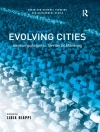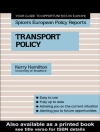This book explores the concept, techniques and implications of establishing stakeholder collaboration in sustainable tourism. The importance of involving a wide range of stakeholders in tourism planning and management is increasingly recognised. This reflects a move to less top-down, more decentralised and more inclusive forms of governance in tourism and in other policy fields. Twenty-two leading researchers and practitioners from around the world contribute their views and expertise to this pioneering volume. Case studies examining key issues are drawn from Europe, North and South America, Australia and the Arctic. Section 1 examines the processes, patterns and typologies involved. Specific concerns addressed include stakeholder interaction and negotiation, boundary issues in regional and international partnerships and stages of collaborative development. Section 2 evaluates the effects of politics and power on the practice of collaboration. Specific topics here include the changing roles of the state in tourism governance, regime theory and tourism, the public sector and partnership development and partnerships in a post socialist context. Section 3 looks at emerging thinking and approaches, sums up key issues affecting collaborative tourism planning and suggests future research directions. The book will be invaluable for final year undergraduate tourism students, for postgraduate students in tourism, environmental studies or planning and of interest to tourism planners, managers and consultants.
表中的内容
Preface
The Contributors
Introduction
1 Bill Bramwell and Bernard Lane: Collaboration and Partnerships in Tourism Planning
Section 1: Processes and Patterns
2 Dallen J. Timothy: Cross-Border Partnership in Tourism Resource Management: International Parks along the US-Canada Border
3 J.R. Brent Ritchie: Interest Based Formulation of Tourism Policy for Environmentally Sensitive Destinations
4 Steven Parker: Collaboration on Tourism Policy Making: Environmental and Commercial Sustainability on Bonaire, NA
5 Peter Mason, Margaret Johnston and Dave Twynam: The World Wide Fund for Nature Arctic Tourism Project
6 Terry De Lacy and Madeleine Boyd: An Australian Research Partnership Between Industry, Universities and Government: The Cooperative Research Centre for Sustainable Tourism
7 Steve Selin: Developing a Typology of Sustainable Tourism Partnerships
Section 2: Politics and Practice
8 C. Michael Hall: Rethinking Collaboration and Partnership: A Public Policy Perspective
9 Tazim Jamal and Donald Getz: Community Roundtables for Tourism-related Conflicts: The Dialectics of Consensus and Process Structures
10 Philip Long: Tourism Development Regimes in the Inner City Fringe: The Case of Discover Islington, London
11 Alison Caffyn: Is There a Tourism Partnership Life Cycle?
12 Lesley Roberts and Fiona Simpson: Developing Partnership Approaches to Tourism in Central and Eastern Europe
Section 3: Emerging Approaches
13 Maureen G. Reed: Collaborative Tourism Planning as Adaptive Experiments in Emergent Tourism Settings
14 L. Medeiros de Araujo and Bill Bramwell: Stakeholder Assessment and Collaborative Tourism Planning: The Case of Brazil’s Costa Dourada Project
15 Mike Robinson: Collaboration and Cultural Consent: Refocusing Sustainable Tourism
16 Pascal Tremblay: An Evolutionary Interpretation of the Role of Collaborative Partnerships in Sustainable Tourism
Conclusion
17 Bill Bramwell and Bernard Lane: Collaborative Tourism Planning: Issues and Future Directions
Index












